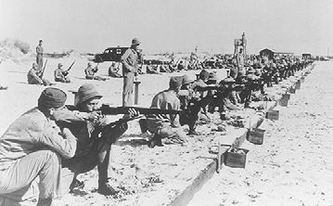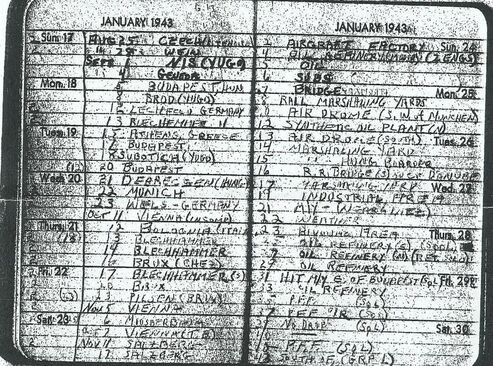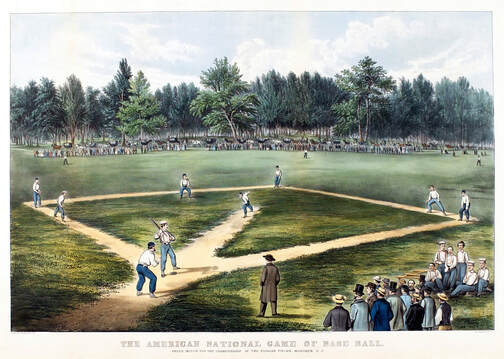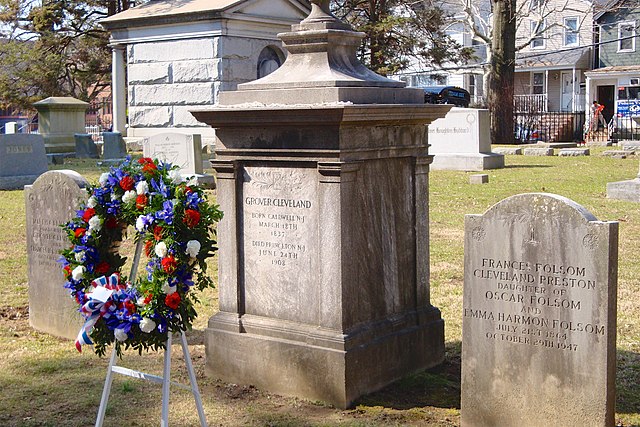-- New Jersey History Timeline - June
* January * February * March * April * May * June * July
* August * September * October * November * December
** Home
|
On June 1 of 1933
New Jersey becomes the fifth state to approve the Twenty-first Amendment repealing the Eighteenth Amendment that initiated Prohibition. During Prohibition, New Jersey served as a key entry point for bootlegged liquor from Canada into the US, particularly through Absecon Island in Atlantic County brought in from boats offshore. On June 2 of 1918
The German submarine U-151 sinks six U.S. ships and damages two others in the space of a few hours off the New Jersey coast, a day which will become known as "Black Sunday". The passenger liner SS Carolina, en route from San Juan, Puerto Rico, to New York with 218 passengers, 117 crew members and a cargo of sugar, is sunk after the U-151 surfaces, fires warning shots from its deck guns to allow evacuation of the ship, and then fires further shells into the ship's port side until it sinks. Most of the ship's life boats are rescued by passing ships, but one motor dory is swamped, with eight passengers and five crew drowning. It was the first loss of life caused by U-Boat activity on the US Atlantic seaboard. 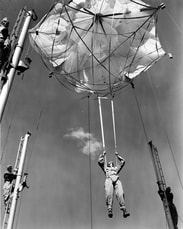
On June 2 of 1935
Famous aviator Amelia Earhart makes the first public parachute jump at the Switlik Parachute Company’s jump-training tower at the Switlik farm in Ocean County. The tower was designed by her husband, George Palmer Putnam, who also was a publisher and author. The Switlik firm's parachute factory was based in Trenton. 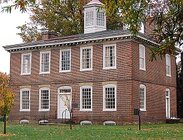 William Trent House William Trent House
On June 3 of 1719
First reported mention of "Trent-Town," named after founder and large landowner William Trent, is made when a constable is appointed while the area was still part of Hunterdon County. In the next year, a jail is built. 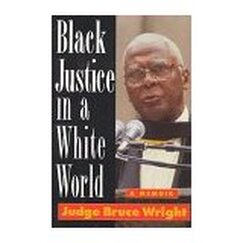
On June 4 of 2001
Princeton University's Class of 2001 names Bruce Wright as an honorary member of its class. Wright was awarded a scholarship to attend Princeton in 1939, but denied admission when the university learned upon his arrival on campus that he was black. Wright later received degrees from Lincoln University and New York Law School, practiced law and served for 25 years as a judge in New York, retiring as a judge of the State Supreme Court. He died in 2005. On June 4 of 1996 Sitting U.S. President Bill Clinton gives the Commencement address at Princeton. He asks students not to forget that Americans have a “common purpose.” “Because of the education you have, if America does well, you will do very well. If America is a good country to live in, you will be able to build a very good life.” On June 4 of 1777
An act providing for the “confiscation of property of all citizens of New Jersey who joined the enemies of the state and country,” is approved by the New Jersey state legislature to punish Loyalists supporting the British. On June 5 of 1969
Over 100 imprisoned soldiers, largely comprised of AWOLs, Vietnam war resisters and conscientious objectors, protest conditions at the Fort Dix prison stockade. Their complaints include being forced to stand without water in the sun for 5 hours and then in a chow line for 3 more hours. When some soldiers demanded water, they were charged with inciting a riot and placed in segregation, sparking a spontaneous rebellion among other prisoners. The rebellion was put down by 250 MPs with tear gas, bayonets, and riot guns. Nine prisoners were seriously injured and others beaten by the MPs. Thirty-eight men were later charged with rioting and arson--known as the “Fort Dix 38”--with five sentenced to terms of two to three years in military prison.. On October 12, a protest march estimated to include up to 10,000, marched to the gate of the fort under the banner of "Free the Fort Dix 38" until they were turned away by MPs who fired tear gas at the crowd.
On June 6 of 1944 D-Day invasion of Europe begins on beaches of Normandy. Over the course of the war in Europe and the Pacific, some 560,000 New Jerseyans served in the armed forces, with 12,565 New Jersey service members dying over the four years of conflict,. and the state was an important center for training and embarkation of over three million troops, particularly at Fort Dix, Camp Kilmer and Camp Boardwalk at Atlantic City. Nearly 10,000 women in the state served in the Women's Army Corps, the Women's Reserve of the Naval Reserve and other groups during the war, with many women also taking jobs in plants serving the war effort. An estimated one million workers were in war-related industries which produced some $12 billion in military orders, the fifth highest of all states
On June 6 of 1933
The first drive-in theater in the US opens in Pennsauken, owned by chemical company executive Richard M. Hollingshead, Jr., who had obtained a patent for the system. On June 7 of 2016
Hillary Clinton claims that she has clinched the 2016 Democratic Presidential nomination on the basis of early returns from the New Jersey primary, where she ultimately scores a 63% to 37% win over Senator Bernie Sanders. 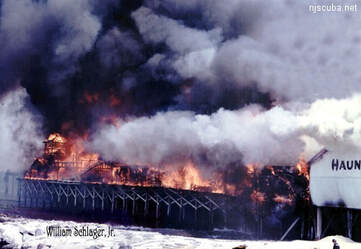
On June 8 of 1987
A fire due to a gas leak destroys an amusement pier off the boardwalk in Long Branch with an arcade, several retail stores, haunted mansion and amusement park. It is never rebuilt, and its site is now the location of the Pier Village dining and shopping complex. 
On June 9 of 1922
The 50-foot high Princeton Battle Monument depicting General George Washington leading his troops at the Battle of Princeton fought on January 3, 1777, is unveiled and dedicated in Princeton with attendees including President Warren G. Harding and representatives from the U.S. Senate and House of Representatives. The ceremony featured a 21-gun salute and military honor guard. On June 9 of 1902
Woodrow Wilson is unanimously elected president of Princeton University, a position he holds until he resigns in 1910 to run for governor of New Jersey. 
On June 10 of 1809
The steamboat Phoenix built by John Stevens and his son Robert L. Stevens at their estate in Hoboken becomes the first steamboat to set out on the open ocean, sailing around New Jersey and up the Delaware River to Philadelphia. |
On June 10 of 2007
The series finale of The Sopranos, HBO’s critically acclaimed, award-winning Mob-family drama set in New Jersey is shown to some 12 million viewers. The series was created by David Chase, a longtime writer, producer and director for TV series who drew inspiration from his Italian-American childhood growing up in New Jersey, The series starred James Gandolfini, a Rutgers graduate, as Tony Soprano.
The series finale of The Sopranos, HBO’s critically acclaimed, award-winning Mob-family drama set in New Jersey is shown to some 12 million viewers. The series was created by David Chase, a longtime writer, producer and director for TV series who drew inspiration from his Italian-American childhood growing up in New Jersey, The series starred James Gandolfini, a Rutgers graduate, as Tony Soprano.
On June 11 of 1935
Electrical engineer Edwin Armstong first demonstrates his invention of FM (frequency modulation) radio by broadcasting from the Hudson Palisades in Alpine, a site on which he later builds a 400-foot tower that is used by W2XMN, the nation's first FM station.
Electrical engineer Edwin Armstong first demonstrates his invention of FM (frequency modulation) radio by broadcasting from the Hudson Palisades in Alpine, a site on which he later builds a 400-foot tower that is used by W2XMN, the nation's first FM station.
On June 11 of 1950
Martin Luther King, Jr., while a seminary student at Crozer Theological Seminary in Chester, Pennsylvania, and residing in Camden with fellow student Walter McCall, stages his first formal sit-in against racial discrimination when he, McCall and two others are refused service at Mary’s Cafe in Maple Shade. Cafe owner Ernest Nichols was arrested after he fired his gun into the air when the group persisted in asking for service, but was later released. The protest led to King’s first lawsuit against discrimination and utilized a New Jersey anti-discrimination law, the first statewide measure approved anywhere in the US.
Martin Luther King, Jr., while a seminary student at Crozer Theological Seminary in Chester, Pennsylvania, and residing in Camden with fellow student Walter McCall, stages his first formal sit-in against racial discrimination when he, McCall and two others are refused service at Mary’s Cafe in Maple Shade. Cafe owner Ernest Nichols was arrested after he fired his gun into the air when the group persisted in asking for service, but was later released. The protest led to King’s first lawsuit against discrimination and utilized a New Jersey anti-discrimination law, the first statewide measure approved anywhere in the US.
On June 12 of 1984
Vincent "Jimmy Sinatra" Craparotta Sr., 56, a reported member of the Lucchese crime family, was bludgeoned to death by three men with golf clubs in Toms River. In 1993, following a 10-week-long trial, four men were convicted of murder and related charges. Authorities contended that Craporatta was killed because he resisted efforts by the Lucchese family to take over a company that made video poker machines owned by Craporatta’s nephews,
On June 12 of 1801
Cyrus Emlay of Burlington County is executed by hanging from a tree for murdering his employer, Constable Humphrey Wall, by striking him with an axe. Emlay admitted that he was “addicted to strong drink, dances and frolics” and previously had been jailed for involvement in a robbery in which he claimed Wall was also involved in, following which he “drank hard, and resolved to murder him.”
On June 13 of 1988
After a four-month trial, a jury in the US District Court in Newark awards the estate of Rose Cipollone of Little Ferry, a smoker for 42 years, $400,000 against The Liggett Group tobacco company on the ground that Liggett had misrepresented the risks of smoking in its advertising for Chesterfield and L&M cigarettes. The verdict is subsequently overturned on appeal, however, restoring the tobacco industry's record to that point of never being held liable for the risks of smoking.
|
On June 14 of 1976 Liberty State Park on the Jersey City waterfront behind the Statue of Liberty is opened on Flag Day to the public, and becomes a central point for viewing the celebration in New York harbor of the nation's Bicentennial on the following July 4 |
|
|
On June 15 of 1992 Vice President Dan Quayle, during a visit to the Rivera Elementary School in Trenton, oversees a spelling bee in which a 12-year-old was called on to spell “potato.” When the student correctly spelled the word, Quayle urged the student to add an "e" at the word's end so it was incorrectly spelled "potatoe". The incident subjected Quayle to wide ridicule, but it was later disclosed that the school had provided Quayle with a flash card that also incorrectly spelled "potatoe". In a later memoir, Quayle wrote: “It was more than a gaffe. It was a ‘defining moment’ of the worst imaginable kind. I can’t overstate how discouraging and exasperating the whole event was.” |
|
|
On June 15 of 1970
Kenneth A. Gibson is elected mayor of Newark in a runoff election, defeating incumbent mayor Hugh Addonizio. Gibson was the first African-American elected mayor of a major city in the eastern United States. He would continue as mayor until defeated for a fifth consecutive term in 1986 by fellow Democrat Sharpe James, a member of the City Council. |
|
On June 16 of 1870
The first boardwalk in Atlantic City is dedicated, built at a cost of $5,000 in 12-foot wide sections one mile long. It is built to reduce tracking of sand into hotel lobbies and railroad cars.
On June 17 of 1879
Thomas Edison is awarded an honorary Doctor of Philosophy degree from the trustees of Rutgers College in New Brunswick
Thomas Edison is awarded an honorary Doctor of Philosophy degree from the trustees of Rutgers College in New Brunswick
On June 17 of 1885
The dismantled Statue of Liberty, a gift of friendship from the people of France to the people of America, arrives in New York Harbor after being shipped across the Atlantic Ocean in 350 individual pieces packed in more than 200 cases. The copper and iron statue, which was reassembled and dedicated on October 28, 1886, by President Grover Cleveland, who said in part, “We will not forget that Liberty has here made her home; nor shall her chosen altar be neglected.”
On June 18 of 1898
The Steel Pier opens in Atlantic City, the first amusement pier at the resort, which later would feature top entertainers and the popular "Diving Horse" attraction
On June 18 of 2023
A deep-sea submersible named Titan, operated by the tourism and expeditions company OceanGate, implodes during an expedition to view the wreck of the Titanic in the North Atlantic Ocean off the coast of Newfoundland, Canada. On board the submersible were Stockton Rush, the CEO of OceanGate; Paul-Henri Nargeolet, a French deep-sea explorer and Titanic expert; Hamish Harding, a British businessman; Shahzada Dawood, a Pakistani-British businessman; and Dawood's son, Suleman. Stockton Rush was an alumnus of Princeton University and a descendant of the prominent Stockton and Rush families who were leaders in the Revolutionary War and the development of the Delaware & Raritan Canal and the Camden & Amboy Railroad.
A deep-sea submersible named Titan, operated by the tourism and expeditions company OceanGate, implodes during an expedition to view the wreck of the Titanic in the North Atlantic Ocean off the coast of Newfoundland, Canada. On board the submersible were Stockton Rush, the CEO of OceanGate; Paul-Henri Nargeolet, a French deep-sea explorer and Titanic expert; Hamish Harding, a British businessman; Shahzada Dawood, a Pakistani-British businessman; and Dawood's son, Suleman. Stockton Rush was an alumnus of Princeton University and a descendant of the prominent Stockton and Rush families who were leaders in the Revolutionary War and the development of the Delaware & Raritan Canal and the Camden & Amboy Railroad.
On June 19 of 1846
The first officially recorded, organized baseball game is played under Alexander Cartwright's rules on the Elysian Fields in Hoboken. The New York Base Ball Club wins by a score of 23 to 1 over the Knickerbockers, with Cartwright umpiring.
On June 20 of 1956
A Venezuelan Airlines Lockheed Super Constellation with students returning from their studies in the US plunges into the Atlantic Ocean approximately 32 miles off Asbury Park, killing all 74 passengers and crew on board. It is the highest death toll of any commercial flight to that point.
A Venezuelan Airlines Lockheed Super Constellation with students returning from their studies in the US plunges into the Atlantic Ocean approximately 32 miles off Asbury Park, killing all 74 passengers and crew on board. It is the highest death toll of any commercial flight to that point.
On June 20 of 1980
The last vehicle produced at the Ford factory in Mahwah over 25 years is finished on the assembly line as the plant closes. It was later discovered that the plant had dumped paint sludge in Upper Ringwood for years, creating a site which would be declared eligible for cleanup under the federal Superfund.
The last vehicle produced at the Ford factory in Mahwah over 25 years is finished on the assembly line as the plant closes. It was later discovered that the plant had dumped paint sludge in Upper Ringwood for years, creating a site which would be declared eligible for cleanup under the federal Superfund.
On June 21 of 1873
The first collegiate track contest in the United States is held by the Princeton Athletic Club at the College of New Jersey (later Princeton University)
On June 22 of 1993
Former first lady Pat Nixon dies in Park Ridge at age 81.
Former first lady Pat Nixon dies in Park Ridge at age 81.
|
On June 23 of 1967 A two-day summit meeting begins in New Jersey at the Hollybush Mansion on the campus of then Glassboro State College (now Rowan University) between President Lyndon Johnson and Soviet Premier Aleksei Kosygin at which they discuss tensions in the Middle East and the nuclear arms race. |
|
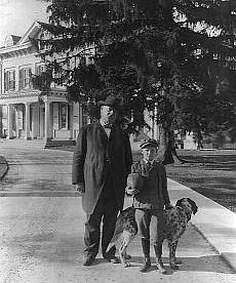 Grover Cleveland with son and dog in driveway of Princeton home
Grover Cleveland with son and dog in driveway of Princeton home
On June 24 of 1908
Grover Cleveland, two term president of the US (1885-1889 and 1893-1897), dies at age 71 in Princeton and is buried in Princeton Cemetery. After completing his second term, Cleveland had purchased a home in Princeton and had been elected as a trustee of Princeton University.
Grover Cleveland, two term president of the US (1885-1889 and 1893-1897), dies at age 71 in Princeton and is buried in Princeton Cemetery. After completing his second term, Cleveland had purchased a home in Princeton and had been elected as a trustee of Princeton University.
|
On June 25 of 1950 The Korean War commences as North Korea invades South Korea. During the course of the conflict, over 190,000 New Jerseyans served in the US military, with 836 losing their lives. South Korean President Syngman Rhee was awarded a Ph.D. degree from Princeton University in 1910. |
|
On June 25 of 1834
The Delaware and Raritan Canal is officially opened with Governor Peter Dumont Vroom and other dignitaries beginning a two-day trip on the canal, during which their barge was met by cheering crowds along the route. When they arrived in New Brunswick, they received a 24-gun salute followed by the Governor and his party parading through the city behind a brass band.
The Delaware and Raritan Canal is officially opened with Governor Peter Dumont Vroom and other dignitaries beginning a two-day trip on the canal, during which their barge was met by cheering crowds along the route. When they arrived in New Brunswick, they received a 24-gun salute followed by the Governor and his party parading through the city behind a brass band.
On June 26 of 1870
The first section of the Atlantic City Boardwalk opens. Alexander Boardman, a railroad conductor, and Jacob Keim, a hotelier, conceived of the idea of constructing a boardwalk as a means of keeping sand out of the railroad cars and hotels. The city used its tax revenues to build an eight-foot-wide temporary wooden walkway from the beach into town that could be dismantled during the winter. Dr. Jonathan Pitney and civil engineer Richard Osborne began developing the area on Absecon Island in the early 1850s.
The first section of the Atlantic City Boardwalk opens. Alexander Boardman, a railroad conductor, and Jacob Keim, a hotelier, conceived of the idea of constructing a boardwalk as a means of keeping sand out of the railroad cars and hotels. The city used its tax revenues to build an eight-foot-wide temporary wooden walkway from the beach into town that could be dismantled during the winter. Dr. Jonathan Pitney and civil engineer Richard Osborne began developing the area on Absecon Island in the early 1850s.
On June 27 of 2010
FBI agents arrest Cynthia and Richard Murphy at their home in Montclair. It is later disclosed that the married couple, whose real names were Vladimir and Lidiya Guryev, had been trained in Russia to embed themselves as Americans to conduct espionage. Shortly after their arrests, the couple were among 10 "sleeper" spies swapped by the US for double-agent Sergei Skripal and three other Russian nationals who'd been imprisoned, three of them for espionage. They continue to reside in Russia.
FBI agents arrest Cynthia and Richard Murphy at their home in Montclair. It is later disclosed that the married couple, whose real names were Vladimir and Lidiya Guryev, had been trained in Russia to embed themselves as Americans to conduct espionage. Shortly after their arrests, the couple were among 10 "sleeper" spies swapped by the US for double-agent Sergei Skripal and three other Russian nationals who'd been imprisoned, three of them for espionage. They continue to reside in Russia.
On June 27 of 1862
New Jersey regiments suffer heavy casualties in their first major action of the Civil War in the Battle of Gaines' Mill in Virginia, as Confederates under Robert E. Lee turn back a Union advance toward Richmond commanded by General George McClellan. The 4th New Jersey Volunteer Infantry has some 400 men captured and suffers nearly 600 casualties.
New Jersey regiments suffer heavy casualties in their first major action of the Civil War in the Battle of Gaines' Mill in Virginia, as Confederates under Robert E. Lee turn back a Union advance toward Richmond commanded by General George McClellan. The 4th New Jersey Volunteer Infantry has some 400 men captured and suffers nearly 600 casualties.
|
On June 28 of 1778
Battle of Monmouth takes place at current Freehold, with British and American armies fighting to a standstill. Fought in intense heat, the Battle gives rise to the story of 'Molly Pitcher' (Mary Ludwig Hays), the wife of a soldier carrying water to the front lines who, after her husband's collapse from the heat, is said to have taken his place at his cannon. |
|
On June 29 of 2006
US District Court Judge William Martini sitting in Newark sentences Andrew Mantovani to 32 months in prison for operating the largest online marketplace for stolen credit card and debit card information, trafficking in at least 1.5 million stolen credit and debit cards.
US District Court Judge William Martini sitting in Newark sentences Andrew Mantovani to 32 months in prison for operating the largest online marketplace for stolen credit card and debit card information, trafficking in at least 1.5 million stolen credit and debit cards.
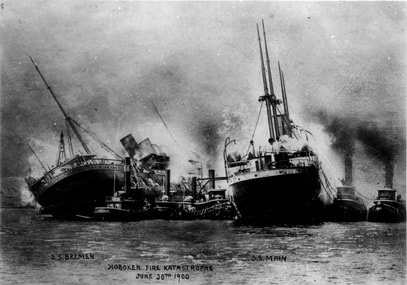
On June 30 of 1900
A fire on the Hoboken docks kills at least 326 persons in and around piers of Germany's Norddeutscher Lloyd shipping company. The fire began when cotton bales stored on NDL’s southernmost wharf caught fire, and winds carried the flames to nearby barrels of volatile liquids, such as turpentine and oil, which exploded in rapid succession, gutting nearby warehouses and three of NDL’s major transatlantic liners.
A fire on the Hoboken docks kills at least 326 persons in and around piers of Germany's Norddeutscher Lloyd shipping company. The fire began when cotton bales stored on NDL’s southernmost wharf caught fire, and winds carried the flames to nearby barrels of volatile liquids, such as turpentine and oil, which exploded in rapid succession, gutting nearby warehouses and three of NDL’s major transatlantic liners.
